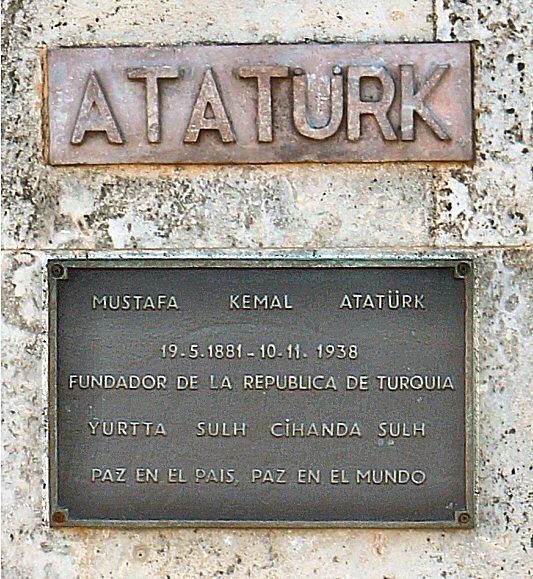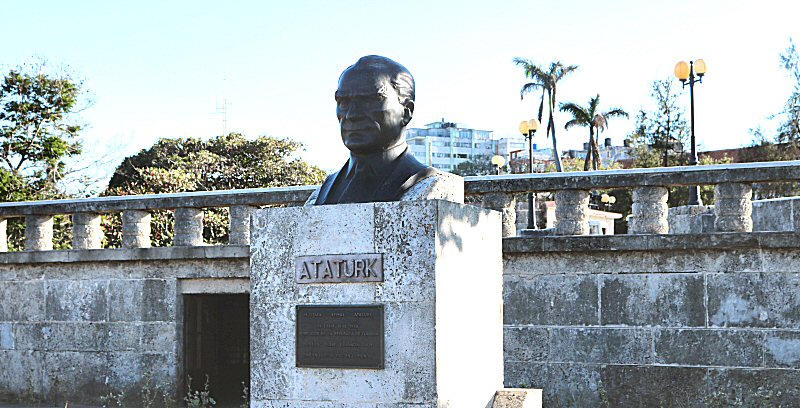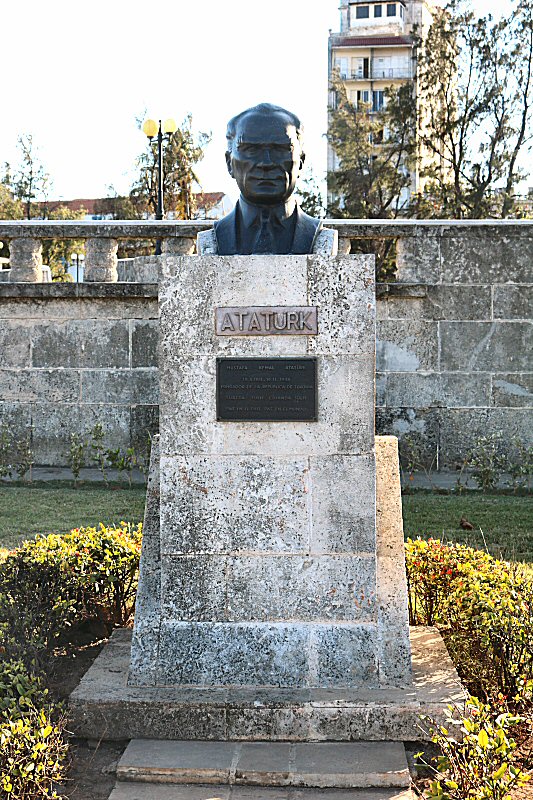
The bust of Atatürk is located on the
northwest corner of the Parque Céspedes, where the Peňa Pobre
street intersects with the Malécon (Avenida del Puerto).
Even though it occupies a part of
the park, the bust of Atatürk, the founder of Republic of
Turkey, can be accessed from Malécon like the other statues
there. Among the statues, embellishing the Malécon-side
border of the Céspedes park, it is the second statue from
the left. On a brass plaque, attached to its pedestal, it is
written his famous phrase: Yurtta sulh, cihanda sulh (Peace
in the country, peace in the world). The bronze bust is the
work of the Turkish sculptor Metin Yurdanur, and it was
unveiled in 2008. The sculptor is known also by his
sculptural work of José Martí in the Park of José Martí in
Ankara, capitol of Turkey, erected in 2006.
In Havana, there was another bust of
Atatürk in a triangular, little park, bordered by the Linea,
street K and street 13. It was erected by the initiative of
Gürbüz Çapan, the former Mayor of the county Esenyurt in
Istanbul, in 1994. There was a plaque on the pedastal; it is
the plaque that is mounted on the pedastal of the current
Atatürk’s bust in the Parque Céspedes. Concomitantly, the
busts of Atatürk and José Martí were erected in Havana
Özgürlük Parkı (Havana Freedom Park) in Esenyurt that was
built in memoriam of the warriors of freedom of both the
nations. However, in 2007 Atatürk’s bust in Havana was
subjected to violence. It was conspicuous that only the bust
of Atatürk was splintered and broken off from its pedestal,
although the other busts in the same park that belonged to
some international personalities, were kept intact. The
chief of the police Carlos Fernandez explained that this
bust of Atatürk was destroyed by some aggressive Kurdish
people during the carnival of Havana in 26 July. The
pedestal of this golden bust remained empty for years.
 The
bust of Atatürk is the only statue, erected in Havana, that
belongs to a politician outside of America.
The
bust of Atatürk is the only statue, erected in Havana, that
belongs to a politician outside of America.
The special place of Atatürk in the
politics of Cuba bases on the admiration of the leader cadre
of Cuba to the the revolutionary leader of modern Turkey.
When Nazım Hikmet, the great Turkish poet, met with Fidel
Castro as the term president of World Peace Council to
deliver the Peace Award in Havana in 1961, he told to Castro
the Turkish War of Independence and its leader Atatürk.
Subsequently, Fidel Castro requested a copy of the book
Nutuk (the Speech) by Atatürk from the Turkish Embassey in
Havana. The Turkish Foreign Ministry delivered the English
copy of the book that the Turkish diplomate Bilal Şimşir
found in the National Library in Ankara after a long search.
When Fidel Castro completed the reading of the book, his
respect to Atatürk, the leader of the first anti-imperialist
fight in the world, transmuted to a great sympathy and
admiration that he expressed with the words in 1997: ”You
(the Turks) don’t need to search for another leader.”


